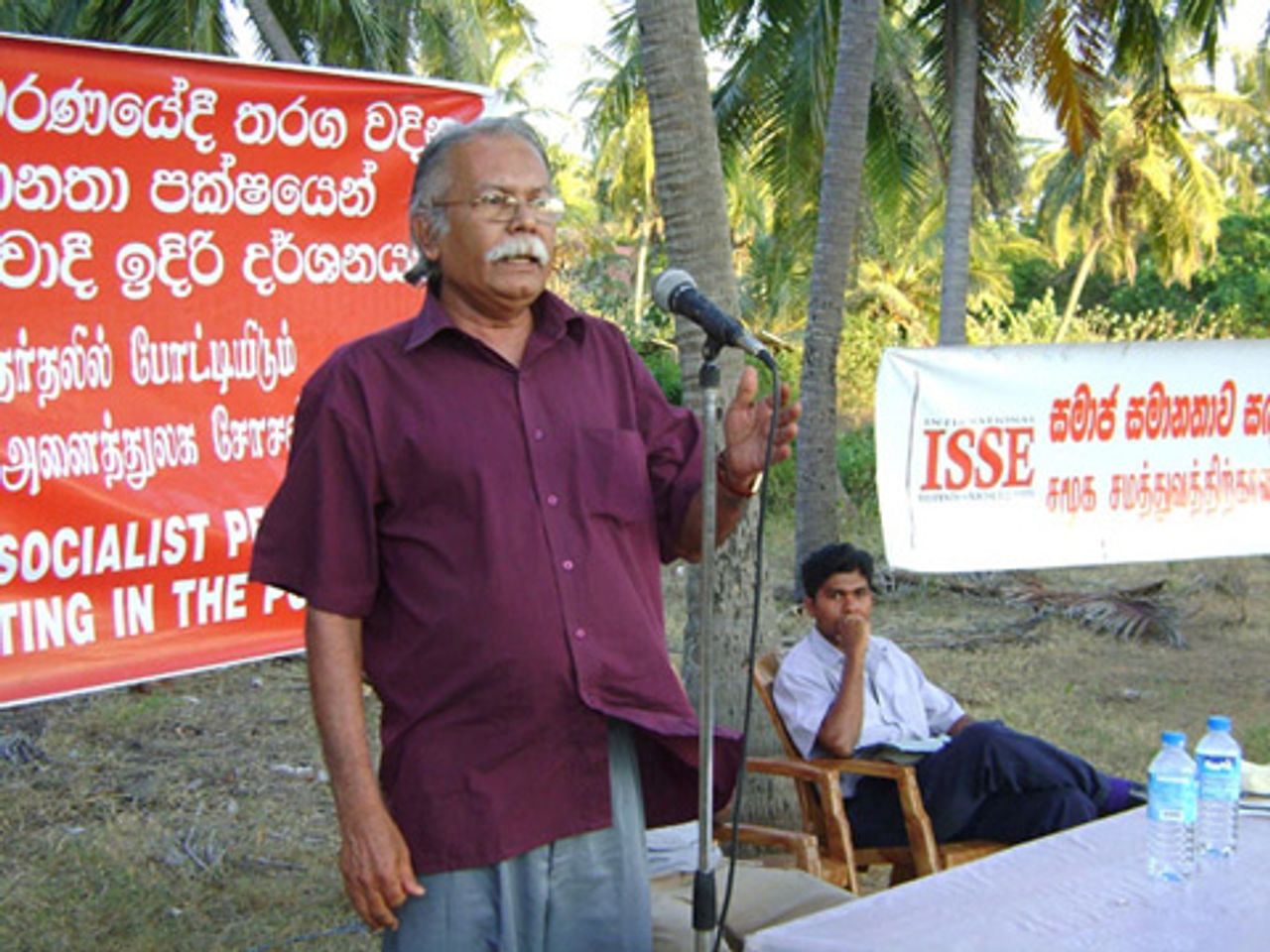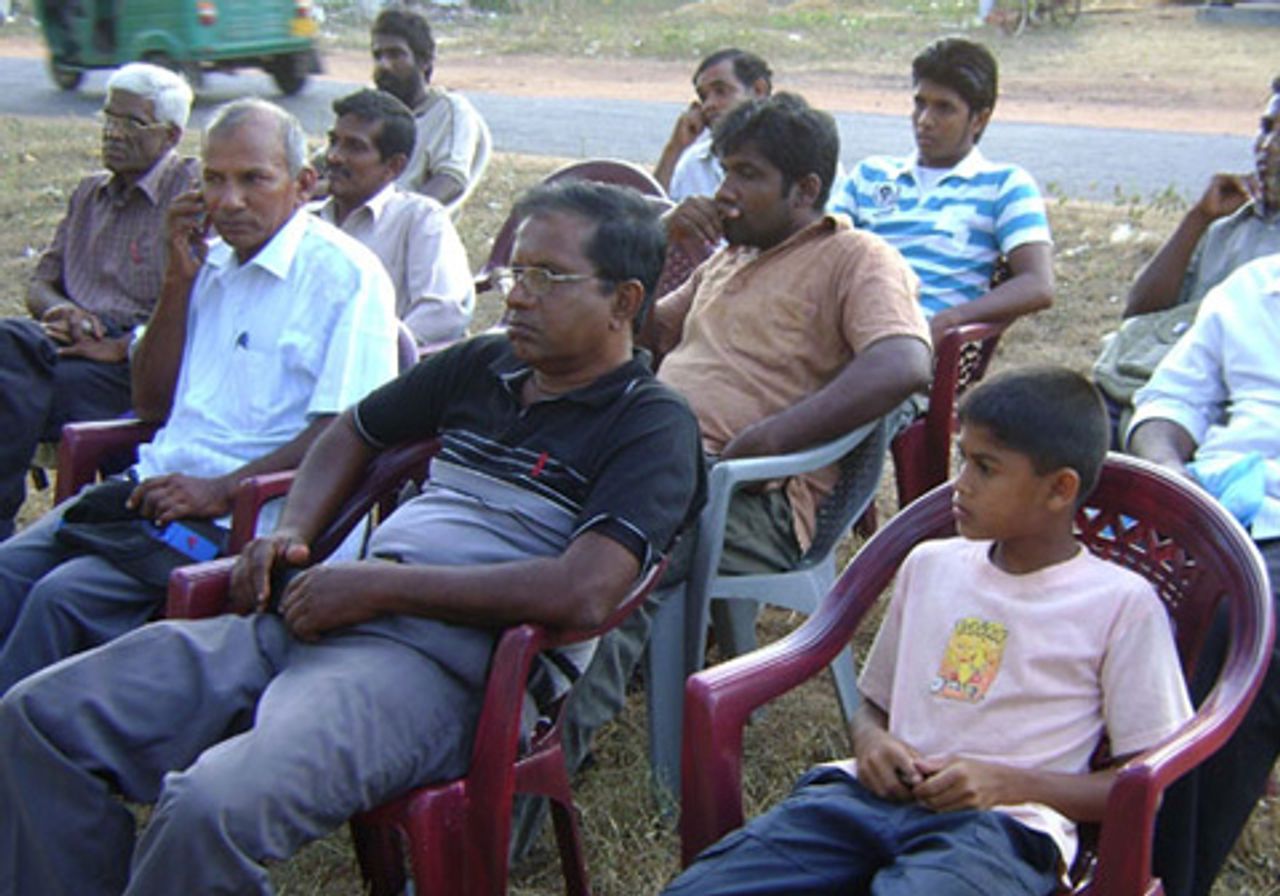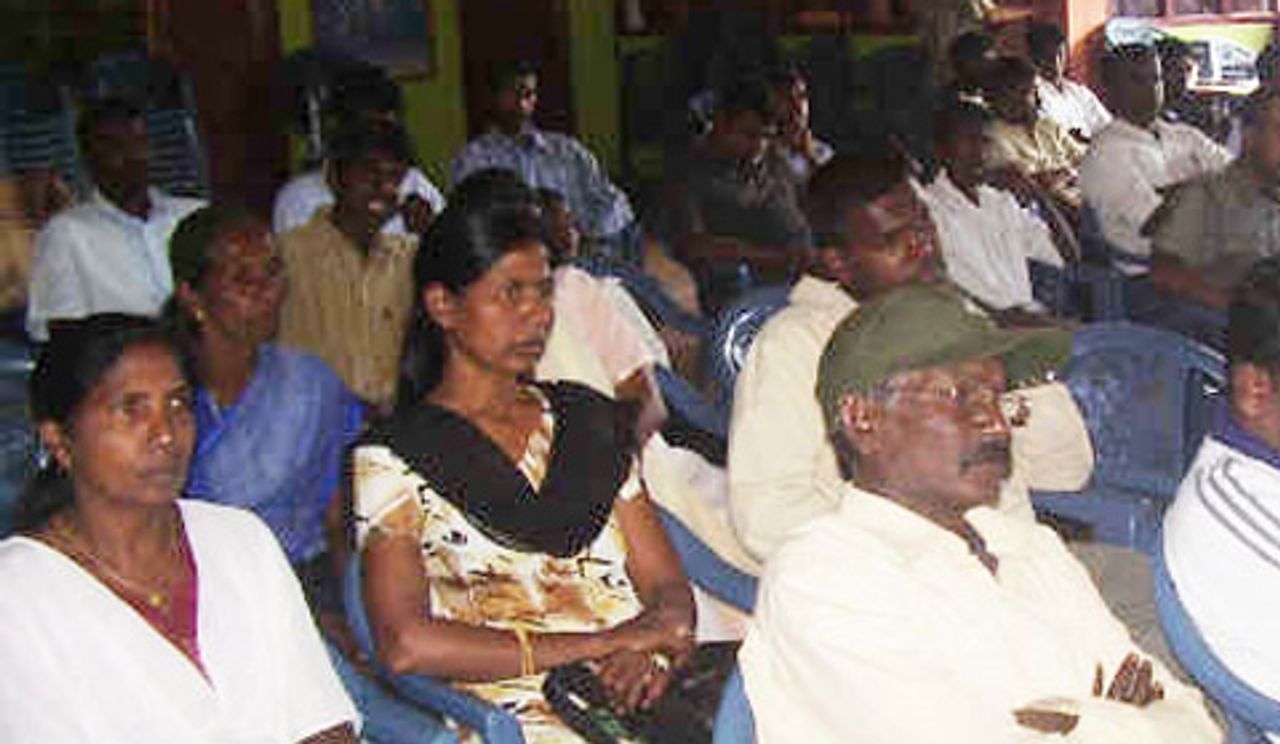The Socialist Equality Party (SEP) held the final meetings this week of its campaign for the February 14 provincial elections in Sri Lanka—on Tuesday at Hatton in the Nuwara Eliya district of Central Province and on Wednesday at Thoduwawa in the Puttalam district of Northwestern Province. Both meetings drew important layers of young people and workers, despite attempts by the police and political opponents to intimidate supporters and block the events.
The meeting in Thoduwawa was originally scheduled for February 7. In violation of the country's election laws, the ruling United People's Freedom Alliance (UPFA) organised its own meeting on the same day within 500 metres of the SEP venue. The police had already granted permission for the SEP to hold an open-air meeting, and posters advertising it had been pasted up throughout the area.
 SEP general secretary Wije Dias speaking in Thoduwawa
SEP general secretary Wije Dias speaking in ThoduwawaThe SEP only heard about the UPFA meeting at the last minute. When the local Marawila police were asked, they declared that they had to allow the UPFA meeting as "powerful politicians," including Labour Minister Mervin Silva, were speaking. When SEP general secretary Wije Dias protested to the Assistant Superintendent of Police, he denied giving permission to the UPFA.
It was obvious that the UPFA intended to hold its meeting regardless and that the police would take no action to move it. The stage was clearly being set for a political provocation against the SEP, quite possibly involving violence. Labour Minister Silva has been involved in violent incidents before. In December 2007, for instance, Silva went to the state-owned Sri Lanka Rupavahini Corporation (SLRC) television station where his thugs physically assaulted a news director for failing to broadcast one of the minister's speeches.
In the circumstances, the SEP felt compelled to postpone its meeting. About 30 people attended the re-scheduled open-air meeting, which followed a campaign in the fishing villages of the Thoduwawa and Iranawila area. Ivan Fernando, a long-standing SEP member and candidate, chaired the meeting. He explained that the UPFA provocative was not a sign of the government's strength but of its weakness, and pointed to the long list of broken promises by all the major parties, which was giving rise to widespread alienation and anger.
 Thoduwawa meeting
Thoduwawa meetingSEP candidate Kapila Fernando, the Sri Lankan convenor of the International Students for Social Equality (ISSE), said the SEP was the only party campaigning to mobilise young people and the working class against the government's communal war and social inequality. "The problems faced by the working people in the two provinces, all over the island and throughout the world are a product of the world capitalist system."
Appealing for youth to join the ISSE, he said: "In this country, most young people have been born and lived under the horrors of war and repression. Unemployment is rampant. Thousands of Tamil and Sinhala youth are perishing in the North and East due to the war. In order to pay for the war, the government has cut spending on education and health, and contributed to the rising prices of essential items."
Nihal Geekiyanage, who heads the SEP list in Puttalam, explained that the civil war had always gone hand-in-hand with an economic onslaught against the working class. "The UNP [United National Party] started the war in 1983. It coincided with growing unrest among the Sri Lankan working class against open economic policies. The government destroyed hundreds of thousands of jobs in the public sector. The war against the Tamils was accompanied by a war on the rights of workers and youth in the south."
Geekiyanage warned that the working class faced a new offensive on its living standards as the worst global economic crisis since the 1930s hit the island. In Sri Lanka, all the major export industries—tea, coconut, rubber, gems and garments—had confronted difficulties. Hundreds of thousands of jobs would be lost as a result. He pointed out that all the "left" parties and trade union leaderships had collaborated in sabotaging the efforts of workers to defend their pay and conditions.
SEP general secretary Wije Dias, who delivered the main address at both meetings, pointed to the dangers facing workers: "Working people, the rural poor and young people throughout the country already face intolerable burdens due to the 25-year communal war. We of the SEP and its predecessor, the Revolutionary Communist League, have always warned that the war against the Tamil minority would be the launching pad for a military-police dictatorship against the masses—Sinhala, Tamil and Muslim."
Dias explained that the ruling cabal headed by President Mahinda Rajapakse increasingly rested on the military. Any critic or opponent faced the danger of arrest and detention, or abduction and murder at the hands of death squads operating with the connivance of the armed forces. "Rajapakse's denunciations of each and every struggle of working people to defend wages, jobs, social welfare measures as ‘aiding terrorism' and treasonous is the preparation for a wave of repression against the working class as a whole."
The speaker pointed out that: "The historical roots of the communal carnage in Sri Lanka go back to the establishment of a separate state on this island cut off from the Indian mainland, in 1948. It was part of the dismemberment of the subcontinent by the British imperialists in connivance with the local bourgeoisie. Our historical heritage is anchored in the struggle of the Trotskyist Bolshevik Leninist Party of India to unify the working class in the fight for a socialist federation of the Indian sub-continent."
Dias explained that the daily arrest of dozens of Sri Lankan fishermen by the Indian navy and the detention of Indian fishermen by the Sri Lankan military was as a case in point of the irrationality of the bourgeois state structures of the region. It was one more argument for the fight for a United Socialist Republic of Sri Lanka and Eelam as part of a socialist federation of South Asia. Production globally had to be freed from the anarchy of the market and the outmoded nation state system and organised to meet social needs, not private profit.
 A section of the Hatton meeting
A section of the Hatton meetingThe SEP's meeting at the Shakthi Hall in Hatton took place amid a campaign of police harassment and intimidation. The party had already held three meetings at Hatton, Upcot and Talawakelle and distributed around 10,000 copies in Tamil and Sinhala of a statement of its policies. The SEP's campaign received considerable interest among plantation workers, who are increasingly hostile to their traditional parties—the Ceylon Workers Congress (CWC) and Upcountry Peoples Front (UPF)—which are part of the Rajapakse government.
The SEP began to receive reports that police were visiting those who had shown interest in the party's campaign. Several days after the SEP's first meeting in Hatton, police questioned a woman who lives at the nearby town of Dickoya about her participation. The following day, police went to the house of SEP candidate Thevapahi Savarimuttu, asking about his whereabouts and his income.
During the election meeting itself, plainclothes police could be seen around the meeting hall, including those involved in the previous police visits. An unknown individual sat inside the hall manager's room. The manager explained to the SEP that he did not know the man or why he was there. When the meeting's organisers asked the person to leave, he refused and only did so when the Hatton police station was called. Two people with video cameras pretending to be journalists also tried to enter the hall. When challenged, they could provide no proof of their identity or occupation, and beat a hasty retreat.
Following the meeting, police followed those who had taken part, demanded their identity cards and addresses and, in at least one case, seized SEP campaign material. The following day, police visited one of those who had attended and told her to come to the police station, where her details were again taken down. The SEP has issued a formal complaint to the Election Violence Monitoring Unit about police harassment and the violation of the party's democratic rights. The unit is based at the Hatton police station.
Despite the police intimidation, around 50 people attended the Hatton meeting, including plantation workers, young people, housewives and teachers. After each of the meetings, WSWS reporters spoke to some of those who had participated.
A young teacher who works in North Puttalam, said: "I know there is huge social inequality in the world. It is now developing with this economic crisis. I think the only solution is socialism. I saw a big difference between the SEP's meeting and those of others. It explained many meaningful things like the roots of the Sri Lankan war. But I want to study further the SEP's solutions to the war.
"There is a big campaign going on about the army's victories for the nation. My staff members sometimes claim, ‘We want to save our nation'. This is how rulers try to create communalism. North Puttalam is a very rural area. Many young people from that area are in the army. There are no other jobs. Students who pass their ordinary levels and advanced levels ask, ‘Sir, can you find me a job'." How can we help them?"
Kumudu, a housewife, said she had decided to vote for the SEP. "Other politicians came to power with our votes but then they don't care about us. Look at the injustice facing the fishermen. Fishermen are arrested. The price of fuel has not decreased even though the world price is down. Last time, the government came to power with the support of the JVP. This time it is using the war. War is their existence."
After the Hatton meeting, P, a worker from an estate in Nawalapitiya, said: "I came here on my way to Maskeliya. We are long-time CWC members. I saw the speakers were different and participated. This is the first time I have come to this type of meeting."
Manimaran said: "The war should be stopped. See how many people have been killed in the war. If it continues who are they going to rule? Will they bring people from abroad! See the prices—the ordinary people are suffering. The politicians do not suffer. No one urges us on like this party. Other politicians criticise this and that but no one shows us a way forward. Our eyes had been blind, but now they have been opened."
